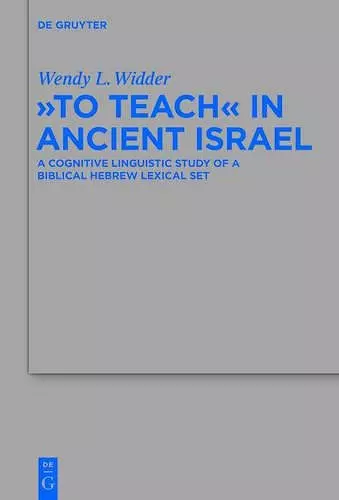"To Teach" in Ancient Israel
A Cognitive Linguistic Study of a Biblical Hebrew Lexical Set
Format:Hardback
Publisher:De Gruyter
Published:20th Jan '14
Currently unavailable, and unfortunately no date known when it will be back

This book employs cognitive linguistics to determine the foundational elements of the ancient Israelites’ concept of teaching as reflected in the text of the Hebrew Bible and Ben Sira. It analyzes four prominent lexemes that comprise a lexical set referring to the act of teaching: ירה-H, למד-D, ידע-H, and יסר-D. The study concludes that, in its most basic form, the concept of teaching in ancient Israel was that a teacher creates the conditions in which learning can occur. The methodology employed in this project is built on a premise of cognitive studies, namely, that because teaching is a universal human activity, there is a universal concept of teaching: one person A recognizes that another person B lacks knowledge, belief, skills, and the like (or has incomplete or distorted knowledge, etc.), and person A attempts to bring about a changed state of knowledge, belief, or skill in person B. This universal concept provides the starting place for understanding the concept of teaching that Biblical Hebrew reflects, and it also forms the conceptual base against which the individual lexemes are profiled. The study incorporates a micro-level analysis and a macro-level analysis. At the micro-level, each lexeme is examined with respect to its linguistic forms (the linguistic analysis) and the contexts in which the lexeme occurs (the conceptual analysis). The linguistic analysis considers the clausal constructions of each instantiation and determines what transitivity, ditransitivity, or intransitivity contributes to the meaning. Collocations of the lexeme, including prepositional phrases, adverbial adjuncts, and parallel verbs, are evaluated for their contribution to meaning. The conceptual analysis of each lexeme identifies the meaning potential of each word, as well as what aspect of the meaning potential each instantiation activates. The study then determines the lexeme’s prototypical meaning, which is profiled on the base of the universal concept of teaching. This step of profiling represents an important adaptation of the cognitive linguistics tool of profiling to meet the special requirements of working with ancient texts in that it profiles prototype meanings, not instantiations. In the macro-analysis, the data of all four lexemes in the lexical set are synthesized. The relationships among the lexemes are assessed in order to identify the basic level lexeme and consider whether the lexemes form a folk taxonomy. Finally, the...
ISBN: 9783110335491
Dimensions: unknown
Weight: 498g
256 pages